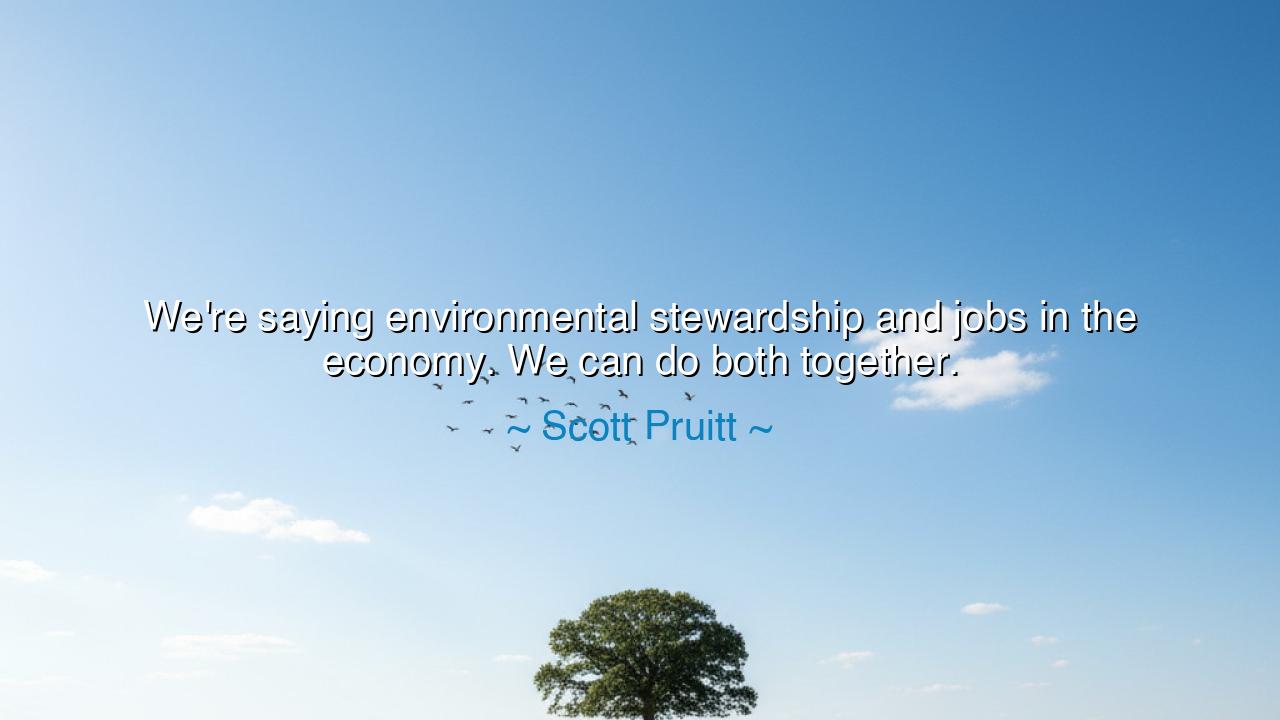
We're saying environmental stewardship and jobs in the economy.
We're saying environmental stewardship and jobs in the economy. We can do both together.






In the measured tone of a statesman seeking balance between progress and preservation, Scott Pruitt declared, “We’re saying environmental stewardship and jobs in the economy. We can do both together.” At first glance, his words may seem like a statement of policy, yet beneath them lies a timeless struggle—the effort to reconcile the needs of man with the needs of the earth. In this brief but powerful utterance, we hear the echo of an ancient truth: that prosperity and preservation are not enemies, but allies, when guided by wisdom and restraint. The ancients, too, knew this lesson—that to draw from nature without gratitude is to steal from one’s own future, but to tend the earth with care ensures abundance for generations to come.
The origin of the quote arises from Pruitt’s tenure as an American public official, one charged with navigating the complex tensions between environmental protection and economic growth. His words reflect a modern dilemma: how can humanity build, trade, and thrive without laying waste to the very world that sustains it? His message—often contested, yet essential—reminds us that true stewardship is not about halting progress, but about harmonizing it. To “do both together” is not merely a political compromise; it is a moral vision that calls upon both innovators and guardians to act as partners in creation, not as adversaries.
For environmental stewardship is more than policy—it is a sacred duty. From the earliest civilizations, man’s relationship with the earth has defined his destiny. The Sumerians irrigated their fields and built mighty cities, yet when they failed to care for their soil, the desert reclaimed their glory. In contrast, the ancient Egyptians, who revered the Nile as divine, prospered for centuries because they respected the rhythm of the land. These lessons are not relics of the past but warnings for the present. The balance between economy and ecology is delicate; to break it is to break ourselves.
Consider the story of Theodore Roosevelt, who stood at the dawn of the industrial age when forests were falling and rivers ran black with pollution. Though a man of progress and power, he saw that unchecked greed would leave a barren inheritance for his children. So he set aside vast lands for national parks, declaring them the common treasure of all people. Roosevelt understood, as Pruitt later would echo, that economic vitality need not come at the cost of natural beauty—that to protect the wilderness was not to hinder industry, but to preserve the foundation upon which all industry rests.
Pruitt’s call to unity—“We can do both together”—is thus a plea for balance, not division. The farmer who rotates his crops, the miner who restores the land he disturbs, the engineer who invents cleaner energy—all are heirs to this principle. Progress that destroys its own foundation is folly; but progress that nourishes the world becomes wisdom. To labor with reverence for creation is to turn work into worship, and policy into stewardship. When economy and environment move in concert, both become stronger, just as two oxen yoked together plow straighter than one alone.
Yet there is also a warning in his words. For too often, mankind speaks of balance but acts in excess. We must remember that stewardship is not passive care—it is active guardianship. To “do both together” demands integrity: the will to innovate responsibly, to restrain greed, and to invest not only in profit but in renewal. The businessman, the legislator, the worker, and the citizen each hold a part of this covenant. To see the earth as a partner in enterprise, not a tool to be spent, is to build prosperity that endures beyond a single lifetime.
Let us then take this wisdom to heart. The earth and the economy are not opposing forces, but two strands of the same tapestry. When one frays, the other weakens. Each tree, each river, each field is a silent partner in the wealth of nations. To protect them is to protect ourselves. We must encourage innovation that heals, industry that replenishes, and governance that looks not only to the present quarter but to the seventh generation hence.
And so, the lesson stands: prosperity without stewardship is ruin, but stewardship joined with progress is renewal. Let every builder, every leader, and every citizen remember this as sacred law. We can indeed do both together—but only if we remember that in every act of creation lies the duty to protect what was created before us. For in caring for the earth, we care for our own soul, and in preserving its bounty, we preserve the hope of all who will come after us.






AAdministratorAdministrator
Welcome, honored guests. Please leave a comment, we will respond soon